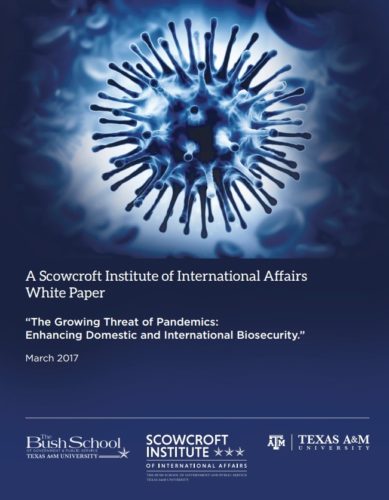Growing Threat Of Global Pandemics Addressed In Scowcroft Institute White Paper
When examining epidemics or pandemics like the 2014 Ebola outbreak, senior policy analysts at Texas A&M University say they are able to pinpoint breakdowns in the system that have catastrophic consequences if left uncorrected. These include response delays that allow outbreaks to become an international public health and humanitarian crisis, the ineffectiveness of the World Health Organization, a lack of institutional capacity in disease hot spots, the reemergence of vaccine-preventable diseases due to anti-vaccine activists, gaps in health screening, and a lack of unifying biosecurity leadership in the United States.
A new white paper by the Scowcroft Institute for International Affairs at Texas A&M’s Bush School of Government and Public Service examines pandemic response gaps and proposes solutions to strengthen preparedness.
“Emerging infectious diseases with pandemic potential are one the greatest threats to our national security,” said Gerald W Parker, senior fellow in the Scowcroft Institute. “We find ourselves in a war against microbes, and our defense must include unifying leadership and investments in global health security to prevent outbreaks from becoming pandemics.
The white paper, titled “The Growing Threat of Pandemics: Enhancing Domestic and International Biosecurity,” aims to create an effective plan for reducing the threat of global pandemics and reducing the need for costly emergency funding to react to outbreaks once they are out of control. The paper also encourages the Trump administration and Congress to consider enhanced global health foreign aid and other related investments targeted at pandemic prevention as a national security priority that is economically advantageous in the long term.
“Preparing for and responding to diseases with pandemic potential is one of the greatest challenges modern society faces,” said Andrew Natsios, director of the Scowcroft Institute. “These outbreaks cause loss of life, loss in personal and national income, and foreign policy challenges.”
“Disease is virtually invisible until it has already begun establishing itself in a population,” said Christine Crudo Blackburn, a postdoctoral research fellow in the Scowcroft Institute. “That is why preparing to respond to disease outbreaks in a quick and effective manner is so important.”
Many of the major obstacles standing in the way of optimal pandemic prevention, preparedness, and response were discussed during the 2nd Annual Pandemic Policy Summit hosted by the Scowcroft Institute last fall.
Bush School Dean Mark Welsh noted that Texas A&M is uniquely positioned to address these complex issues.
“The Institute’s broad experience, along with the technical expertise available at Texas A&M, enables us to bring scholars, government officials, and professionals together to develop and recommend responses to what is clearly a rapidly growing international issue,” said Welsh.
###
Media Contact: Susan Robertson, srobertson@tamu.edu, 979.862.8845
To read the full report, please visit:
http://bush.tamu.edu/scowcroft/white-papers/
For more news about Texas A&M University, see https://today.tamu.edu/.
Follow us on Twitter at https://twitter.com/TAMU







